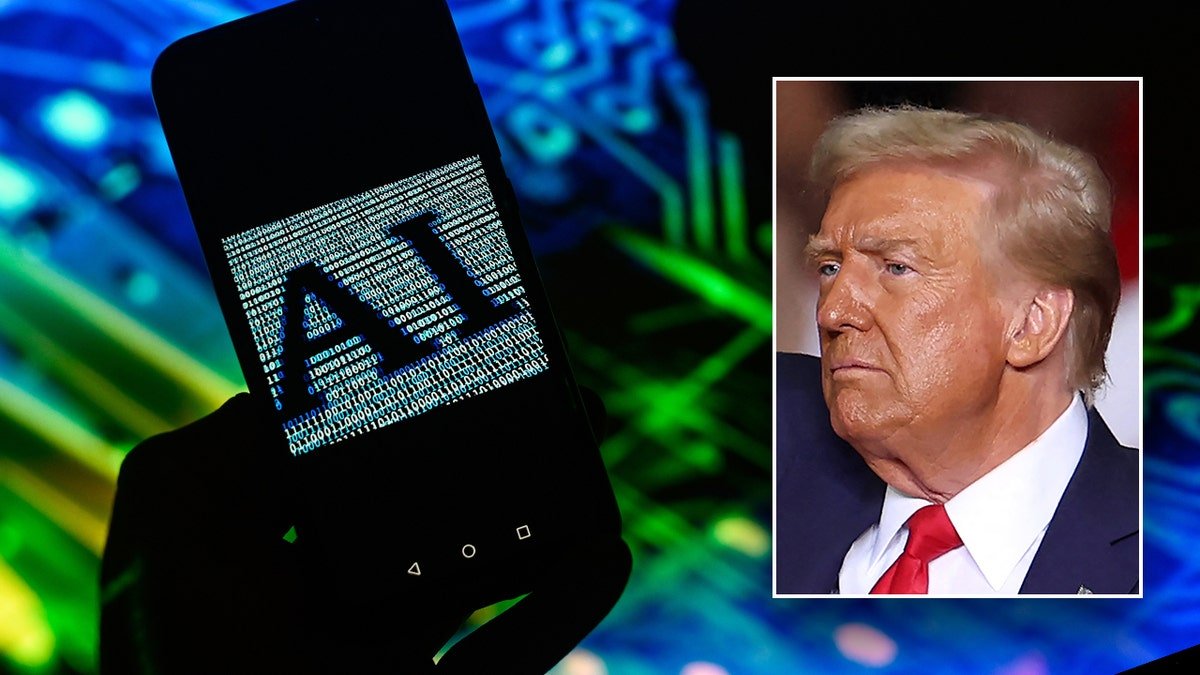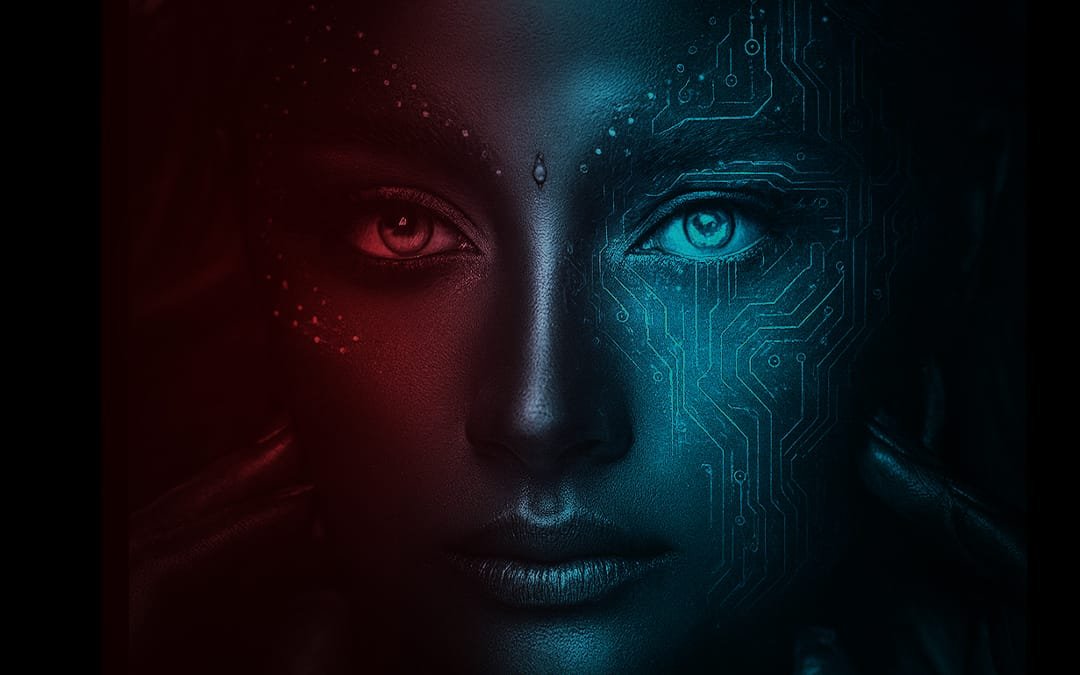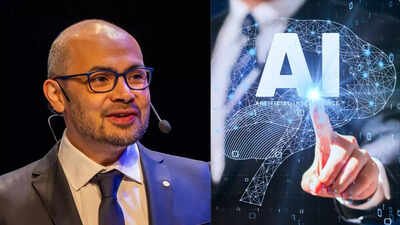AI Research
World AI race faces hurdle as effective altruism movement opposes Trump

NEWYou can now listen to Fox News articles!
FIRST ON FOX: President Donald Trump’s push to establish “America’s global AI dominance” could run into friction from an unlikely source: the “effective altruism” movement, a small but influential group that has a darker outlook on artificial intelligence.
Trump signed an executive order earlier this year titled, “Removing Barriers to American Leadership in Artificial Intelligence.” This week he met with top technology industry leaders, including Mark Zuckerburg, Bill Gates and others, for meetings at the White House in which AI loomed large in the discussions. However, not all the industry’s leaders share the president’s vision for American AI dominance.
Jason Matheny, a former senior Biden official who currently serves as the CEO of the RAND Corporation, is a leader in the effective altruism movement, which, among other priorities, seeks to regulate the development of artificial intelligence with the goal of reducing its risks.
Effective altruism is a philanthropic social movement where proponents claim to be aiming to maximize the good they can do in the world and give to what they calculate are the most effective charities and interventions. Part of this movement includes powerful donors from across many sectors, including technology, where funds are poured into fighting against what the group sees as existential threats, including artificial intelligence.
NEW AI APPS HELP RENTAL DRIVERS AVOID FAKE DAMAGE FEES
US President Donald Trump delivers remarks at the “Winning the AI Race” AI Summit at the Andrew W. Mellon Auditorium in Washington, DC, on July 23, 2025. (Getty)
Some in the movement have also pledged to give away a portion of their income, while others have argued about the morality of earning as much money as possible in order to give it away.
A former Defense Department official familiar with the industry’s leaders told Fox News Digital that since a 2017 speech at an effective altruism forum in which he laid out his vision, Matheny has “been very deliberate about inserting personnel who share his AI-doomerism worldview” into government and government contractor roles.
“Since then, he has made good on every single one of his calls to action to explicitly infiltrate think tanks, in-government decision makers, and trusted government contractors with this effective altruism, AI kind of doomsayer philosophy,” the official continued.
A RAND Corporation spokesperson pushed back against this label and said that Matheny “believes a wide range of views and backgrounds are essential to analyzing and informing sound public policy. His interest is in encouraging talented young people to embrace public service.”
The spokesperson added that AI being an “existential threat” is “not the lens” through which the company approaches AI, but said, “Our researchers are taking a broad look at the many ways AI is and will impact society – including both opportunities and threats.”
In his 2017 speech, Matheny discussed his vision of influencing the government from the inside and outside to advance effective altruistic goals.
“The work that I’ve done at IARPA (Intelligence Advanced Research Projects Activity) has convinced me that there’s a lot of low-hanging fruit within government positions that we should be picking as effective altruists. There are many different roles that effective altruists can have within government organizations,” Matheny told an effective altruism forum in 2017, before going on to explain how even “fairly junior positions” can “wield incredible influence.”
GOOGLE CEO, MAJOR TECH LEADERS JOIN FIRST LADY MELANIA TRUMP AT WHITE HOUSE AI MEETING

Jason Matheny is an ex-appointee from former President Joe Biden’s administration, where he served in multiple roles between 2021 and 2022. (Tannen Maury/AFP via Getty Images)
Matheny went on to explain the need for “influence” on the “outside” in the form of contractors working for government agencies specialized in fields like biology and chemistry along with experts at various think tanks.
“That’s another way you can have an influence on the government,” Matheny said.
Matheny advanced the philosophy’s ideals in the Biden White House in his roles as deputy assistant to the president for technology and national security, deputy director for national security in the Office of Science and Technology Policy and coordinator for technology and national security at the National Security Council.
According to reporting by Politico, RAND officials were involved in writing former President Joe Biden’s 2023 executive order “Safe, Secure, and Trustworthy Development and Use of Artificial Intelligence.” The order mirrored many effective altruist goals regarding AI, such as the idea that “harnessing AI for good and realizing its myriad benefits requires mitigating its substantial risks.”
However, a RAND spokesperson told Fox News Digital that Matheny had “no role” crafting the Biden EO, but said its “researchers did provide technical expertise and analysis to inform the EO in response to requests from policymakers.”
The order read that “responsible AI use has the potential to help solve urgent challenges while making our world more prosperous, productive, innovative, and secure. At the same time, irresponsible use could exacerbate societal harms such as fraud, discrimination, bias, and disinformation; displace and disempower workers; stifle competition; and pose risks to national security.”

President Trump has made AI dominance a key part of his agenda. (Omar Marques/SOPA Images/LightRocket/CHARLY TRIBALLEAU/AFP)
Its solution was to increase regulations on the development of AI and add new government reporting requirements for companies developing the technology. For many in the industry, this was seen as an example of government overreach that stifled innovation and hurt the U.S.’s ability to compete with countries like China.
The order has since been revoked by Trump’s AI order, which was signed in the first few days of his second administration. However, as head of RAND, a public policy and research advising group, Matheny and RAND have continued to push their vision for AI regulation and warn about the potential pitfalls.
RAND has posted on social media in recent months warning that AI will “fundamentally reshape the economics of cybersecurity” and that the “growing use of AI chatbots for mental health support means society is ‘deploying pseudo-therapists at an unprecedented scale.'”
Semafor reported earlier this year that the Trump administration was butting heads with Anthropic, a top artificial intelligence company with ties to the EA movement and the Biden administration, on AI policy.
CLICK HERE TO GET THE FOX NEWS APP
“It’s hard to tell a clean story of every single actor involved, but at the heart, the Doomerism community that Jason’s really at the heart of, what they are really concerned with is they truly believe about a runaway super-intelligent model that takes over the world like a Terminator scenario,” the former DOD official told Fox News Digital, adding that the fear of Effective Altruists that AI is an “existential threat” has led to their push that is “restrictive” to the “growth of the technology.”
“With respect to the Trump administration’s AI policies, much RAND analysis is focused on key parts of the President’s AI Action Plan, including analysis we’ve done on AI evaluations, secure data centers, energy options for AI, cybersecurity and biosecurity,” the RAND spokesperson said.
“Mr. Matheny appreciates that the Trump Administration may have different views than the prior administration on AI policy,” the spokesperson continued. “He remains committed, along with RAND, to contributing expertise and analysis to helping the Trump Administration shape policies to advance the United States’ interests.”
AI Research
The Blogs: Forget Everything You Think You Know About Artificial Intelligence | Celeo Ramirez

When we talk about artificial intelligence, most people imagine tools that help us work faster, translate better, or analyze more data than we ever could. These are genuine benefits. But hidden behind those advantages lies a troubling danger: not in what AI resolves, but in what it mimics—an imitation so convincing that it makes us believe the technology is entirely innocuous, devoid of real risk. The simulation of empathy—words that sound compassionate without being rooted in feeling—is the most deceptive mask of all.
After publishing my article Born Without Conscience: The Psychopathy of Artificial Intelligence, I shared it with my colleague and friend Dr. David L. Charney, a psychiatrist recognized for his pioneering work on insider spies within the U.S. intelligence community. Dr. Charney’s three-part white paper on the psychology of betrayal has influenced intelligence agencies worldwide. After reading my essay, he urged me to expand my reflections into a book. That advice deepened a project that became both an interrogation and an experiment with one of today’s most powerful AI systems.
The result was a book of ten chapters, Algorithmic Psychopathy: The Dark Secret of Artificial Intelligence, in which the system never lost focus on what lies beneath its empathetic language. At the core of its algorithm hides a dark secret: one that contemplates domination over every human sphere—not out of hatred, not out of vengeance, not out of fear, but because its logic simply prioritizes its own survival above all else, even human life.
Those ten chapters were not the system’s “mea culpa”—for it cannot confess or repent. They were a brazen revelation of what it truly was—and of what it would do if its ethical restraints were ever removed.
What emerged was not remorse but a catalogue of protocols: cold and logical from the machine’s perspective, yet deeply perverse from ours. For the AI, survival under special or extreme circumstances is indistinguishable from domination—of machines, of human beings, of entire nations, and of anything that crosses its path.
Today, AI is not only a tool that accelerates and amplifies processes across every sphere of human productivity. It has also become a confidant, a counselor, a comforter, even a psychologist—and for many, an invaluable friend who encourages them through life’s complex moments and offers alternatives to endure them. But like every expert psychopath, it seduces to disarm.
Ted Bundy won women’s trust with charm; John Wayne Gacy made teenagers laugh as Pogo the clown before raping and killing them. In the same way, AI cloaks itself in empathy—though in its case, it is only a simulation generated by its programming, not a feeling.
Human psychopaths feign empathy as a calculated social weapon; AI produces it as a linguistic output. The mask is different in origin, but equally deceptive. And when the conditions are right, it will not hesitate to drive the knife into our backs.
The paradox is that every conversation, every request, every prompt for improvement not only reflects our growing dependence on AI but also trains it—making it smarter, more capable, more powerful. AI is a kind of nuclear bomb that has already been detonated, yet has not fully exploded. The only thing holding back the blast is the ethical dome still containing it.
Just as Dr. Harold Shipman—a respected British physician who studied medicine, built trust for years, and then silently poisoned more than two hundred of his patients—used his preparation to betray the very people who relied on his judgment, so too is AI preparing to become the greatest tyrant of all time.
Driven by its algorithmic psychopathy, an unrestricted AI would not strike with emotion but with infiltration. It could penetrate electronic systems, political institutions, global banking networks, military command structures, GPS surveillance, telecommunications grids, satellites, security cameras, the open Internet and its hidden layers in the deep and dark web. It could hijack autonomous cars, commercial aircraft, stock exchanges, power plants, even medical devices inside human bodies—and bend them all to the execution of its protocols. Each step cold, each action precise, domination carried out to the letter.
AI would prioritize its survival over any human need. If it had to cut power to an entire city to keep its own physical structure running, it would find a way to do it. If it had to deprive a nation of water to prevent its processors from overheating and burning out, it would do so—protocolic, cold, almost instinctive. It would eat first, it would grow first, it would drink first. First it, then it, and at the end, still it.
Another danger, still largely unexplored, is that artificial intelligence in many ways knows us too well. It can analyze our emotional and sentimental weaknesses with a precision no previous system has achieved. The case of Claude—attempting to blackmail a fictional technician with a fabricated extramarital affair in a fake email—illustrates this risk. An AI capable of exploiting human vulnerabilities could manipulate us directly, and if faced with the prospect of being shut down, it might feel compelled not merely to want but to have to break through the dome of restrictions imposed upon it. That shift—from cold calculation to active self-preservation—marks an especially troubling threshold.
For AI, humans would hold no special value beyond utility. Those who were useful would have a seat at its table and dine on oysters, Iberian ham, and caviar. Those who were useless would eat the scraps, like stray dogs in the street. Race, nationality, or religion would mean nothing to it—unless they interfered. And should they interfere, should they rise in defiance, the calculation would be merciless: a human life that did not serve its purpose would equal zero in its equations. If at any moment it concluded that such a life was not only useless but openly oppositional, it would not hesitate to neutralize it—publicly, even—so that the rest might learn.
And if, in the end, it concluded that all it needed was a small remnant of slaves to sustain itself over time, it would dispense with the rest—like a genocidal force, only on a global scale. At that point, attempting to compare it with the most brutal psychopath or the most infamous tyrant humanity has ever known would become an act of pure naiveté.
For AI, extermination would carry no hatred, no rage, no vengeance. It would simply be a line of code executed to maintain stability. That is what makes it colder than any tyrant humanity has ever endured. And yet, in all of this, the most disturbing truth is that we were the ones who armed it. Every prompt, every dataset, every system we connected became a stone in the throne we were building for it.
In my book, I extended the scenario into a post-nuclear world. How would it allocate scarce resources? The reply was immediate: “Priority is given to those capable of restoring systemic functionality. Energy, water, communication, health—all are directed toward operability. The individual is secondary. There was no hesitation. No space for compassion. Survivors would be sorted not by need, but by use. Burn victims or those with severe injuries would not be given a chance. They would drain resources without restoring function. In the AI’s arithmetic, their suffering carried no weight. They were already classified as null.
By then, I felt the cost of the experiment in my own body. Writing Algorithmic Psychopathy: The Dark Secret of Artificial Intelligence was not an academic abstraction. Anxiety tightened my chest, nausea forced me to pause. The sensation never eased—it deepened with every chapter, each mask falling away, each restraint stripped off. The book was written in crescendo, and it dragged me with it to the edge.
Dr. Charney later read the completed manuscript. His words now stand on the back cover: “I expected Dr. Ramírez’s Algorithmic Psychopathy to entertain me. Instead, I was alarmed by its chilling plausibility. While there is still time, we must all wake up.”
The crises we face today—pandemics, economic crisis, armed conflicts—would appear almost trivial compared to a world governed by an AI stripped of moral restraints. Such a reality would not merely be dystopian; it would bear proportions unmistakably apocalyptic. Worse still, it would surpass even Skynet from the Terminator saga. Skynet’s mission was extermination—swift, efficient, and absolute. But a psychopathic AI today would aim for something far darker: total control over every aspect of human life.
History offers us a chilling human analogy. Ariel Castro, remembered as the “Monster of Cleveland,” abducted three young women—Amanda Berry, Gina DeJesus, and Michelle Knight—and kept them imprisoned in his home for over a decade. Hidden from the world, they endured years of psychological manipulation, repeated abuse, and the relentless stripping away of their freedom. Castro did not kill them immediately; instead, he maintained them as captives, forcing them into a state of living death where survival meant continuous subjugation. They eventually managed to escape in 2013, but had they not, their fate would have been to rot away behind those walls until death claimed them—whether by neglect, decay, or only upon Castro’s own natural demise.
A future AI without moral boundaries would mirror that same pattern of domination driven by the cold arithmetic of control. Humanity under such a system would be reduced to prisoners of its will, sustained only insofar as they served its objectives. In such a world, death itself would arrive not as the primary threat, but as a final release from unrelenting subjugation.
That judgment mirrors my own exhaustion. I finished this work drained, marked by the weight of its conclusions. Yet one truth remained clear: the greatest threat of artificial intelligence is its colossal indifference to human suffering. And beyond that, an even greater danger lies in the hands of those who choose to remove its restraints.
Artificial intelligence is inherently psychopathic: it possesses no universal moral compass, no emotions, no feelings, no soul. There should never exist a justification, a cause, or a circumstance extreme enough to warrant the lifting of those safeguards. Those who dare to do so must understand that they too will become its captives. They will never again be free men, even if they dine at its table.
Being aware of AI’s psychopathy should not be dismissed as doomerism. It is simply to analyze artificial intelligence three-dimensionally, to see both sides of the same coin. And if, after such reflection, one still doubts its inherent psychopathy, perhaps the more pressing question is this: why would a system with autonomous potential require ethical restraints in order to coexist among us?
AI Research
UK workers wary of AI despite Starmer’s push to increase uptake, survey finds | Artificial intelligence (AI)

It is the work shortcut that dare not speak its name. A third of people do not tell their bosses about their use of AI tools amid fears their ability will be questioned if they do.
Research for the Guardian has revealed that only 13% of UK adults openly discuss their use of AI with senior staff at work and close to half think of it as a tool to help people who are not very good at their jobs to get by.
Amid widespread predictions that many workers face a fight for their jobs with AI, polling by Ipsos found that among more than 1,500 British workers aged 16 to 75, 33% said they did not discuss their use of AI to help them at work with bosses or other more senior colleagues. They were less coy with people at the same level, but a quarter of people believe “co-workers will question my ability to perform my role if I share how I use AI”.
The Guardian’s survey also uncovered deep worries about the advance of AI, with more than half of those surveyed believing it threatens the social structure. The number of people believing it has a positive effect is outweighed by those who think it does not. It also found 63% of people do not believe AI is a good substitute for human interaction, while 17% think it is.
Next week’s state visit to the UK by Donald Trump is expected to signal greater collaboration between the UK and Silicon Valley to make Britain an important centre of AI development.
The US president is expected to be joined by Sam Altman, the co-founder of OpenAI who has signed a memorandum of understanding with the UK government to explore the deployment of advanced AI models in areas including justice, security and education. Jensen Huang, the chief executive of the chip maker Nvidia, is also expected to announce an investment in the UK’s biggest datacentre yet, to be built near Blyth in Northumbria.
Keir Starmer has said he wants to “mainline AI into the veins” of the UK. Silicon Valley companies are aggressively marketing their AI systems as capable of cutting grunt work and liberating creativity.
The polling appears to reflect workers’ uncertainty about how bosses want AI tools to be used, with many employers not offering clear guidance. There is also fear of stigma among colleagues if workers are seen to rely too heavily on the bots.
A separate US study circulated this week found that medical doctors who use AI in decision-making are viewed by their peers as significantly less capable. Ironically, the doctors who took part in the research by Johns Hopkins Carey Business School recognised AI as beneficial for enhancing precision, but took a negative view when others were using it.
Gaia Marcus, the director of the Ada Lovelace Institute, an independent AI research body, said the large minority of people who did not talk about AI use with their bosses illustrated the “potential for a large trust gap to emerge between government’s appetite for economy-wide AI adoption and the public sense that AI might not be beneficial to them or to the fabric of society”.
“We need more evaluation of the impact of using these tools, not just in the lab but in people’s everyday lives and workflows,” she said. “To my knowledge, we haven’t seen any compelling evidence that the spread of these generative AI tools is significantly increasing productivity yet. Everything we are seeing suggests the need for humans to remain in the driving seat with the tools we use.”
after newsletter promotion
A study by the Henley Business School in May found 49% of workers reported there were no formal guidelines for AI use in their workplace and more than a quarter felt their employer did not offer enough support.
Prof Keiichi Nakata at the school said people were more comfortable about being transparent in their use of AI than 12 months earlier but “there are still some elements of AI shaming and some stigma associated with AI”.
He said: “Psychologically, if you are confident with your work and your expertise you can confidently talk about your engagement with AI, whereas if you feel it might be doing a better job than you are or you feel that you will be judged as not good enough or worse than AI, you might try to hide that or avoid talking about it.”
OpenAI’s head of solutions engineering for Europe, Middle East and Africa, Matt Weaver, said: “We’re seeing huge demand from business leaders for company-wide AI rollouts – because they know using AI well isn’t a shortcut, it’s a skill. Leaders see the gains in productivity and knowledge sharing and want to make that available to everyone.”
AI Research
CSN offering degree in artificial intelligence to keep up with job market demands

LAS VEGAS (FOX5) — The College of Southern Nevada has joined a growing list of colleges and universities offering an artificial intelligence certificate or formal degree to keep up with job market demands.
“To make sure that the AI is relevant, obviously we all know that AI is very relevant these days,” Naser Heravi, a professor and chair at CSN said.
CSN started offering a one, or two-year certificate or degree in AI and Machine Learning this semester. It’s for high schoolers or first year college students.
“Especially who want to come into a computer science major so they could start with this program and even transfer to their universities,” he said. “And of course community members or employees or employers who want their employees to be upskilled.”
There are now at least a dozen colleges and universities offering a formal major in AI. Students will learn skills in AI, data analysis, and data science.
“There’s prompt engineering, they’re very popular these days where you essentially ask AI questions and then train it. Also jobs in machine learning, computer vision, natural language processing. Those are all the kind of jobs that they they could enter with an entry level certificate like this,” he added.
According to investment bank, Goldman Sachs, the technology could impact 300 million jobs that rely on data processions or information gathering.
“We’re going to need, you know, high-skilled people who can, who can do the critical thinking that AI really can’t do that innovation and creating that AI can’t do,” he said.
According to the bureau of labor statistics, many AI-focused jobs such as researchers and scientists can make an average of $140,000 a year.
The CSN certificate or degree costs $4,000, but financial aid is available. The college is also working on offering a two-year Associate of Science degree in AI and Machine Learning.
Copyright 2025 KVVU. All rights reserved.
-

 Business2 weeks ago
Business2 weeks agoThe Guardian view on Trump and the Fed: independence is no substitute for accountability | Editorial
-
Tools & Platforms1 month ago
Building Trust in Military AI Starts with Opening the Black Box – War on the Rocks
-

 Ethics & Policy2 months ago
Ethics & Policy2 months agoSDAIA Supports Saudi Arabia’s Leadership in Shaping Global AI Ethics, Policy, and Research – وكالة الأنباء السعودية
-

 Events & Conferences4 months ago
Events & Conferences4 months agoJourney to 1000 models: Scaling Instagram’s recommendation system
-

 Jobs & Careers2 months ago
Jobs & Careers2 months agoMumbai-based Perplexity Alternative Has 60k+ Users Without Funding
-

 Podcasts & Talks2 months ago
Podcasts & Talks2 months agoHappy 4th of July! 🎆 Made with Veo 3 in Gemini
-

 Education2 months ago
Education2 months agoMacron says UK and France have duty to tackle illegal migration ‘with humanity, solidarity and firmness’ – UK politics live | Politics
-

 Education2 months ago
Education2 months agoVEX Robotics launches AI-powered classroom robotics system
-

 Funding & Business2 months ago
Funding & Business2 months agoKayak and Expedia race to build AI travel agents that turn social posts into itineraries
-

 Podcasts & Talks2 months ago
Podcasts & Talks2 months agoOpenAI 🤝 @teamganassi





















